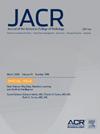Perceived Discrimination and Pandemic Attitudes on Cancer Screening Behaviors Among Asian American Women: A Sequential Explanatory Mixed-Methods Study
IF 4
3区 医学
Q1 RADIOLOGY, NUCLEAR MEDICINE & MEDICAL IMAGING
引用次数: 0
Abstract
Purpose
The aim of this study was to assess how pandemic-related health concerns and discrimination affected cancer screenings among Asian American women (AAW).
Methods
A two-phase explanatory mixed-methods study was conducted. In phase 1, a survey was distributed among AAW eligible for lung, breast, or colorectal cancer screening to assess delays during the pandemic, concerns about contracting coronavirus disease 2019 (COVID-19), barriers to care, and experiences of discrimination. In phase 2, four qualitative focus group discussions, stratified by generational status and history of delayed cancer screening, were conducted to explore a priori domains of interest on cancer screening during the pandemic and perceived discrimination. Logistic regression analyses were performed to identify factors associated with delays, followed by deductive thematic qualitative analysis.
Results
In phase 1, of 225 participants recruited, 166 met the inclusion criteria (74%). Most participants were first-generation Americans (67%), were employed (65%), and had higher education (67% with a master’s degree or higher). Forty percent reported delays in cancer screening. Factors associated with delays included worry about contracting COVID-19 (adjusted odds ratio, 2.57; 95% confidence interval, 1.05-6.28; P = .038) and spreading it to family or friends (adjusted odds ratio, 5.78; 95% confidence interval, 1.50-22.3; P = .011). No association between discrimination and delayed cancer screening was found. In phase 2, focus group discussions (n = 19) revealed that first-generation women who delayed screening faced barriers due to a fear of infection and perceived discrimination. Perceived discrimination affected daily behaviors and sense of safety, though less so in medical settings.
Conclusions
Delays in cancer screening among AAW were associated with patients’ concerns about contracting and spreading COVID-19. Radiology practices can lead collaborative efforts on cancer screening campaigns that emphasize early detection and promote psychological safety.
认知歧视和流行态度对亚裔美国女性癌症筛查行为的影响:一项顺序解释混合方法研究。
目的:本研究的目的是评估与大流行相关的健康问题和歧视如何影响亚裔美国妇女(AAW)的癌症筛查。方法:采用两期解释性混合方法研究。在第一阶段,对有资格进行肺癌、乳腺癌或结直肠癌筛查的AAW进行了一项调查,以评估大流行期间的延误、对感染2019冠状病毒病(COVID-19)的担忧、护理障碍和歧视经历。在第2阶段,进行了四次定性焦点小组讨论,按代际地位和延迟癌症筛查的历史分层,以探索大流行期间癌症筛查的先验兴趣领域和感知歧视。进行逻辑回归分析以确定与延迟相关的因素,然后进行演绎主题定性分析。结果:在第一阶段,招募的225名受试者中,166名符合纳入标准(74%)。大多数参与者是第一代美国人(67%),有工作(65%),受过高等教育(67%拥有硕士或更高学位)。40%的人报告了癌症筛查的延误。与延误相关的因素包括担心感染COVID-19(调整后的优势比为2.57;95%置信区间为1.05-6.28;P = 0.038)并将其传播给家人或朋友(校正优势比,5.78;95%置信区间为1.50-22.3;P = .011)。没有发现歧视和延迟癌症筛查之间的联系。在第二阶段,焦点小组讨论(n = 19)显示,由于害怕感染和感知歧视,延迟筛查的第一代女性面临障碍。感知到的歧视影响了日常行为和安全感,尽管在医疗环境中影响较小。结论:AAW的癌症筛查延迟与患者对COVID-19感染和传播的担忧有关。放射学实践可以引导癌症筛查活动的合作努力,强调早期发现和促进心理安全。
本文章由计算机程序翻译,如有差异,请以英文原文为准。
求助全文
约1分钟内获得全文
求助全文
来源期刊

Journal of the American College of Radiology
RADIOLOGY, NUCLEAR MEDICINE & MEDICAL IMAGING-
CiteScore
6.30
自引率
8.90%
发文量
312
审稿时长
34 days
期刊介绍:
The official journal of the American College of Radiology, JACR informs its readers of timely, pertinent, and important topics affecting the practice of diagnostic radiologists, interventional radiologists, medical physicists, and radiation oncologists. In so doing, JACR improves their practices and helps optimize their role in the health care system. By providing a forum for informative, well-written articles on health policy, clinical practice, practice management, data science, and education, JACR engages readers in a dialogue that ultimately benefits patient care.
 求助内容:
求助内容: 应助结果提醒方式:
应助结果提醒方式:


